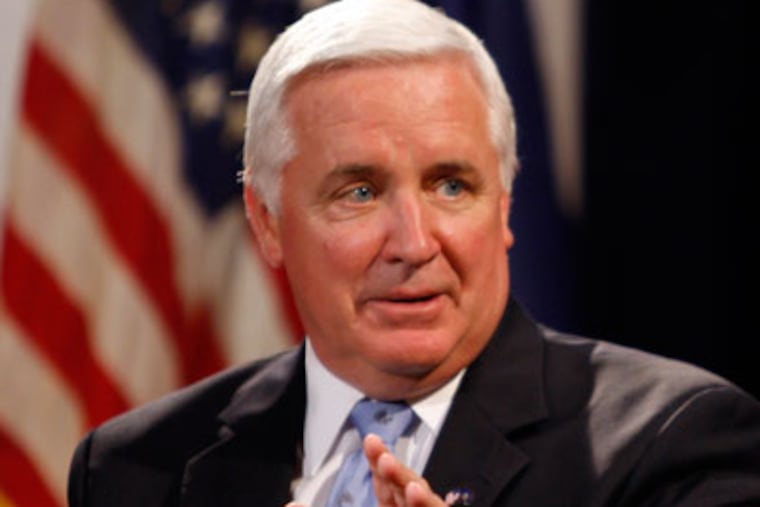Inquirer Editorial: Two wrongs can't be right
With their decision to leave it to Washington to launch online marketplaces for health insurance in their states, Govs. Corbett and Christie contend they're merely being fiscally prudent about Obamacare.

With their decision to leave it to Washington to launch online marketplaces for health insurance in their states, Govs. Corbett and Christie contend they're merely being fiscally prudent about Obamacare.
But by joining the growing number of Republican governors opting against state-run health-insurance exchanges, the governors' moves also feed into the continuing rearguard GOP campaign against the Affordable Care Act.
The governors couldn't kill President Obama's signature legislation in the courts. Yet their resistance continues, despite the president's convincing reelection, fueled in part by ballot majorities in both Pennsylvania and New Jersey.
The ultimate losers, due to the governors' recalcitrance, will be some two million residents in the two states, as well as small-business owners, who will use the exchanges to shop for insurance coverage they will be required to have a year from now. Rather than exchanges tailored to each state's market, however, they'll find a one-size federal system.
It's one gauge of the significance of Corbett's decision that the state's hospital trade group - and not just his potential gubernatorial challengers - criticized the governor for failing to take the lead. The Hospital and Healthsystem Association of Pennsylvania, speaking for 250 medical facilities, described the exchanges as "an important initiative to provide access to affordable health-care coverage for low-income individuals and families."
For his part, Corbett on Wednesday said he just couldn't get a straight answer from federal officials as to how the exchanges would work. Christie made much the same case in vetoing exchange legislation last week.
Isn't it odd, though, that 16 states plus the District of Columbia have been able to figure this out? They'll set up their own exchanges. Another eight states will partner with Washington by having stakeholders in their markets pick health plans to be on the exchange and set rates while leaving consumer outreach and enrollment to federal officials.
As for start-up costs, federal funds will cover that. Then, by 2015, the state exchanges likely would levy a small assessment on insurers' sales - a mechanism viewed as a cost-effective way to sell health insurance policies.
Fortunately, both Corbett and Christie will still have the option in a year or so to take full charge of their states' destiny under Obamacare by establishing their own state-run exchanges.
The more troubling concern raised by the governors' decisions is that they seem less and less likely to embrace Obamacare's smart expansion of the Medicaid program - a key strategy to help millions of the working poor gain insurance coverage. Not only would the federal government pay most of the costs, but it's clear that the infusion of billions in new health-care spending would more than counterbalance the states' added Medicaid costs.
In a state that pioneered the children's health insurance coverage initiatives now copied nationally, Corbett's no-can-do approach on health-care reform clearly is the wrong prescription.